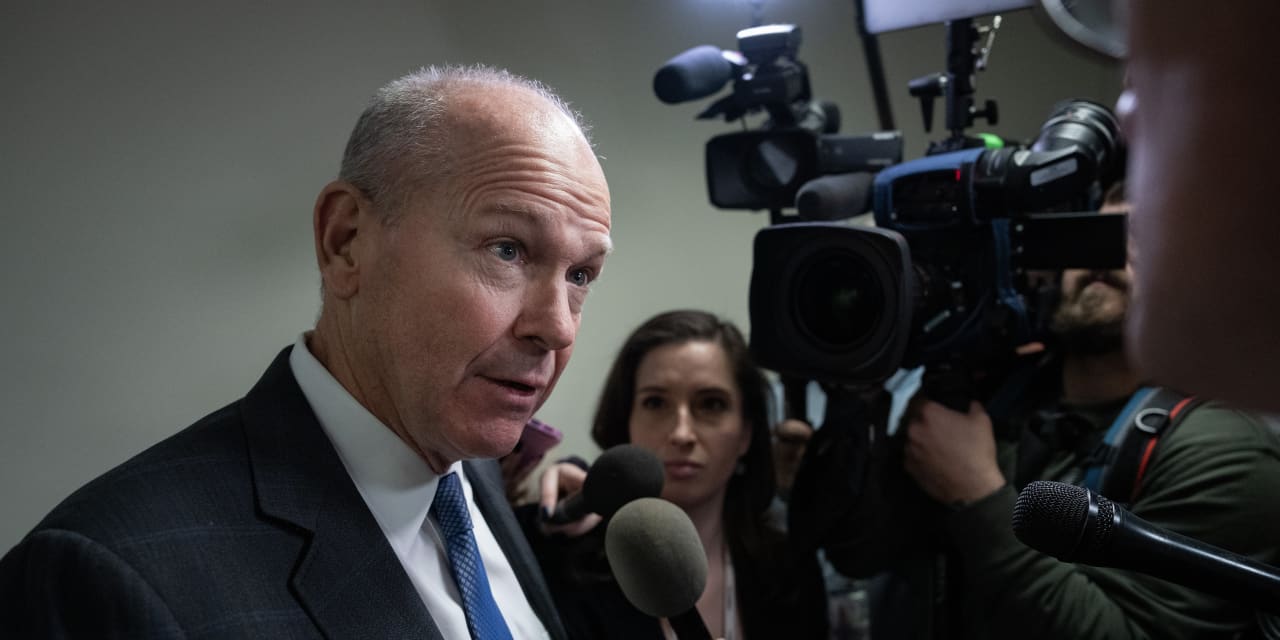The Federal Aviation Administration on Wednesday said it would not allow Boeing Co. to expand production of its Max airplanes after an in-flight blowout this month grounded dozens of them for inspections, and it said it would investigate the jet maker’s compliance with manufacturing protocols.
At the same time, the agency also approved an inspection process to get those grounded jets back into the skies.
Boeing’s stock
BA,
sank 5.6% in morning trading, enough to pace the Dow Jones Industrial Average’s
DJIA
decliners. It has tumbled 22.4% in January, which puts it on track for the worst monthly performance since it plunged 24.4% in September 2022.
“The exhaustive, enhanced review our team completed after several weeks of information gathering gives me and the FAA confidence to proceed to the inspection and maintenance phase,” FAA Administrator Mike Whitaker said in a statement.
“However, let me be clear: This won’t be back to business as usual for Boeing. We will not agree to any request from Boeing for an expansion in production or approve additional production lines for the 737 Max until we are satisfied that the quality control issues uncovered during this process are resolved.”
BofA Securities analyst Ronald Epstein said he believes the FAA mandated freeze of the 737 production rate will delay the aerospace giant from ramping production by “roughly a year.” As a result, he downgraded the stock to neutral from buy and cut his price target to $225 from $255.
And Vertical Research Partners’ Robert Stallard said while predicting what the FAA will do is tough, he thinks reaching a conclusion will take longer and be more onerous than some have been predicting.
“Unlike Boeing’s issues a couple years ago with 787 production quality, the latest 737 MAX issue has definitely resonated with the press, the U.S. flying public, airline bosses and politicians,” wrote. “This could see the process becoming less scientific and more emotional, with the FAA under pressure to ‘punish’ Boeing.”
The FAA’s moves come after a panel known as a door plug tore off a Boeing 737 Max 9 jet flown by Alaska Airlines while it was in the air over the West Coast this month. The FAA, in response, grounded 171 Max 9 jets for inspection. That incident has raised questions about quality-control protocols at Boeing and the regulators who oversee them.
Also read: Alaska Air’s grounding of Boeing 737 Max 9 fleet to cost $150 million.
The FAA’s decisions also came after Boeing’s chief executive, Dave Calhoun, met with U.S. lawmakers in Washington. They were also made ahead of an FAA review on Boeing’s safety practices that was started last year. The FAA on Wednesday said it expected a report on the review’s findings “within weeks.”
The regulator on Wednesday said it approved a “thorough inspection and maintenance process” required for each of the 171 grounded Boeing 737 Max 9 planes. Once that process was complete, it said, the jets will be “eligible to return to service.”
Late Wednesday, a Boeing spokesperson said: “We will continue to cooperate fully and transparently with the FAA and follow their direction as we take action to strengthen safety and quality at Boeing. We will also work closely with our airline customers as they complete the required inspection procedures to safely return their 737-9 airplanes to service.”
The inspection process requires a look at certain bolts, guide tracks and fittings, the FAA said. It will also require “visual inspections” of mid-cabin exit-door plugs and related parts, retorquing fasteners, and “correcting any damage or abnormal conditions.”
The agency also said it was limiting expanded production of any new Boeing 737 Max jets to ensure compliance. The FAA also said it would conduct an investigation looking into how effectively the company adheres to manufacturing requirements.
“The quality-assurance issues we have seen are unacceptable,” Whitaker said. “That is why we will have more boots on the ground closely scrutinizing and monitoring production and manufacturing activities.”
Sen. Maria Cantwell, D-Wash., said in a thread on X that during the meeting with Calhoun, she said she “made it clear that quality engineering and a commitment to safety always have to be the top priority.”
“The American flying public and Boeing line workers deserve a culture of leadership at Boeing that puts safety ahead of profits,” she said.
Alaska Airlines
ALK,
Chief Executive Ben Minicucci, in an interview on NBC News that ran Tuesday, said that its inspectors found loose bolts on “many” of its Boeing 737 Max 9s after this month’s accident, and expressed anger over the incident.
United Airlines Holdings Inc.
UAL,
which has also found loose bolts on its own Max 9s, said on Tuesday that it was rethinking its longer-term plans for Boeing’s biggest 737 Max jet, the Max 10, after the Max 9’s ongoing issues.
“It’s a great aircraft,” Chief Financial Officer Michael Leskinen said of the Max 10 during United’s earnings call. “But we can’t count on it. So we’re working on alternate plans.”
Boeing’s stock has tumbled 17.9% in January, to make it the worst performer among the Dow Jones Industrial Average’s
DJIA
components year to date. The Dow has edged up 0.3% this year.
Tomi Kilgore contributed.
Read the full article here




